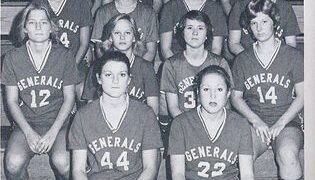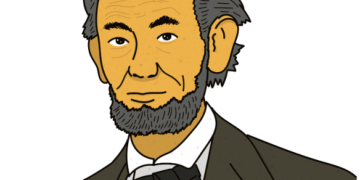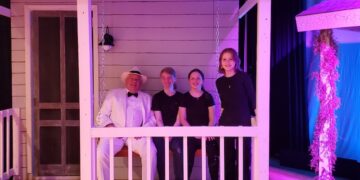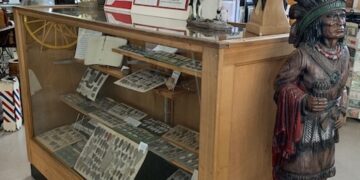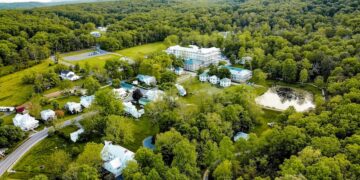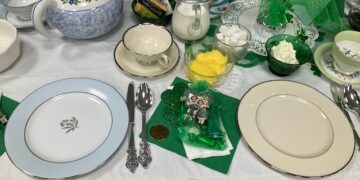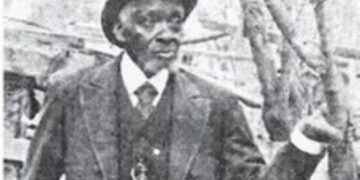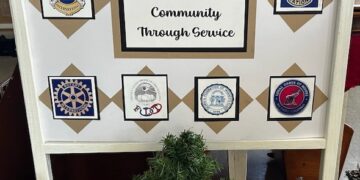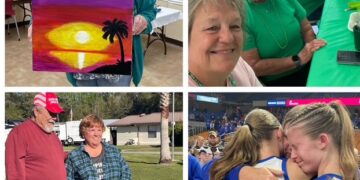Richard and Robert Bausch occupy a unique position among Virginia writers (and among US writers in general): they are identical twins who both forged careers as successful novelists. Richard Bausch has called his brother and himself the “only twin act in American letters.” He has also said being a twin is “. . . fun. It’s the best luck imaginable–in all things, and being writers is just one of them.” When asked to name his favorite writers, Robert Bausch mentioned his brother first! Robert died of cancer in 2018, a traumatic event for his twin. Familiar with the fiction of Richard Bausch, whom I had met earlier, I came to know about Robert through a student of mine at JMU: his daughter. Later I met him when he came to JMU to promote A Hole in the Earth.
The brothers were born in Georgia, but grew up in the DC-Northern Virginia area where they went to high school. Their parents being Roman Catholic, the family was large. Robert said: “My family was big into storytelling. In fact, all my brothers and sisters are wonderful storytellers. . . . My father was the best storyteller I ever saw. He acted out all the parts, remembered whole conversations and just kept everybody laughing.”
After serving in the Air force both brothers earned BA degrees from George Mason University, where they helped found Phoebe, a literary journal. Robert later earned both MA and MFA degrees from George Mason while Richard went to the University of Iowa where he received the MFA degree. Richard Bausch taught for many years at George Mason, where he held the Heritage Chair in writing. Currently, he teaches in the Writing Program at Chapman University in Orange, California. From 1975 until his death, Robert Bausch, too, was a college professor; for most of his career, he taught at Northern Virginia Community College.
During his lifetime, Robert Bausch wrote nine novels and one collection of short stories. .His fourth novel, A Hole in the Earth (2000), was named a New York Times notable book of the year and a Washington Post Favorite Book of the Year. He sold the rights to his third novel, Almighty Me (1991) to Disney Studies for $200,000. Without fulfilling its contract with Bausch, Disney studios released a film version of the novel, Bruce Almighty with Jim Carey in 2003. Bausch considered a law suit but never filed for compensation. In 2009, Longwood College awarded Robert Bausch, the Dos Passos Prize in Literature. He also won a statewide teaching award in 2013 and the Hillsdale Award from the Fellowship of Southern Writers.
To date, Richard Bausch has written 12 novels and eight collections of short stories. He currently has other works in progress. His most successful novels include Rebel Powers (1993), Violence (1992), Hello to the Cannibals (2002), and Thanksgiving Night (2006). He published The Selected Stories of Richard Bausch in (1996). Two of his novels have became feature-length films: The Last Good Time (1984) in 1995 and Peace (2008), renamed Recon , in 2020. Richard Bausch has won numerous awards, among them two National Magazine Awards, a Guggenheim Fellowship, and the Lila-Wallace Reader’s Digest Award. In 1995, he was elected to the Fellowship of Southern Writers and since 1995 he was first co-editor, now sole editor of the Norton Anthology of Short Fiction.
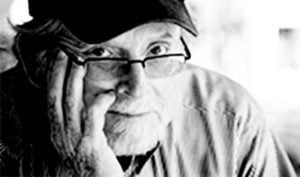
courtesy of Richard Bausch
Robert Bausch’s, A Hole in the Earth (2000), is set in the Northern Virginia, DC, and the Baltimore area. The novel is a clear example of domestic fiction, writing that deals with family concerns and cultural issues. The main character and narrator of the novel is Henry Porter, 39, the youngest child in a large Roman Catholic family. Henry grew up as the somewhat coddled child of older parents. Close to his mother, but in utter awe of his father, a well-known judge, Henry has struggled to establish himself in a family of successful siblings. .
Emerging as the sort of unsettled middle-aged man often featured in recent fiction, Henry, lives through a pivotal summer. His daughter, a recent high school graduate, who has been living with her mother and step-father in California, arrives at his door with her friend Sam. Changes in her appearance and behavior confuse and astound him. Another complication evolves when his girlfriend Elizabeth announces that she is pregnant. The novel combines realism, humor, melodrama, and pathos as Henry finally seems to accept the reality of human existence for what it is.
Richard Bausch set his tenth novel, Thanksgiving Night (2006), in Point Royal, Virginia, a town quite obviously based on Front Royal, as his fictional town exists in the mountains between Manassas and Strasburg. Like A Hole in the Earth, it is a family novel with characters, from different families. Together they cobble together a community family that serves them well. Central to the story are two elderly women, a great-aunt and her niece, Fiona and Holly, roughly of the same age. Holly’s son, Will Butterfield, his two children from his first marriage, and his second wife, Elizabeth, extend that family.
A second family is that of Oliver Ward, a fifty-five year old Viet Nam Veteran, still suffering from a war injury. A widower, he lives with his recently divorced daughter Allison, a local police officer, and her two children. Still another major character in the novel is the local Catholic priest, Father John Fire, who, at the age of 72, is experiencing a loss of faith. His curate, a would-be poet with no talent, adds humor to the narrative.
Through a series of misadventures, the characters create an extended family; they experience the eccentricities of the aging sisters, infidelity in the Butterfield marriage, a school shooting, and ultimately a Thanksgiving dinner that helps solve many of their issues, but, at the same time creates others.
Both novels described are well worth reading.






